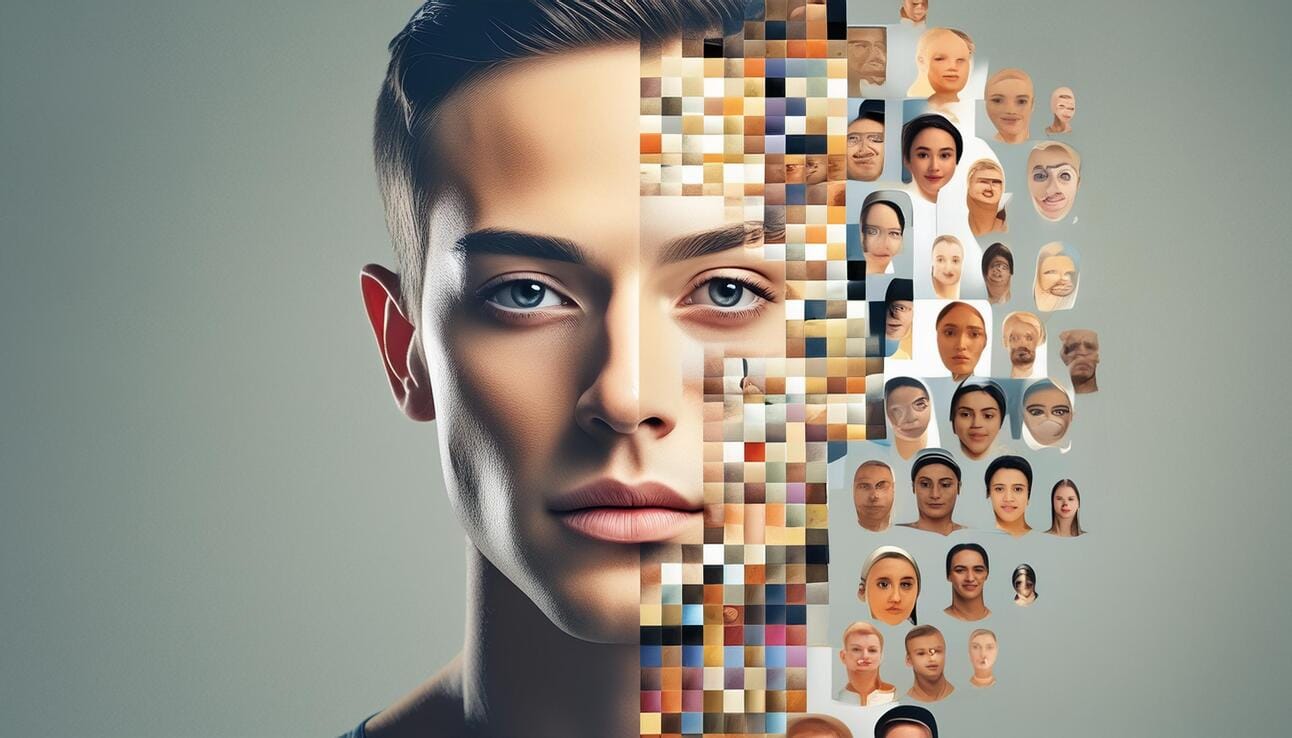
Created with DALL-E 3
Hate Longscrolling? Jump Around!
Hi all. This week we are catching up with big gAI announcements from OpenAI, Google and Microsoft. But first…
Public Media Innovators Live
It was great seeing some of you last week at the PBS Annual Meeting, and welcome to all our new readers. Thanks to everyone who attended our “Whose Prompt Is It Anyway?” live gAI session. We learned a lot putting it together, which was a success in and of itself, but the audience also really seemed into it, so we may produce it again in the future at a conference near you.
And it was also great to then see even more of you at our 3rd Thursday webinar, Navigating the Future with Generative AI Video, with Evo Heyning. If you missed any part of it, or couldn’t make it because you were traveling back from Vegas, you can check it out here. I personally appreciated her guidance on identifying synthetic content as, for example, “generative video” and ditching the “AI” label. Lots of content that deserves the full faith and trust of our viewers/listeners/visitors has been touched in some way by AI at this point. Perhaps this type of labeling will help to de-stigmatize this type of content.
Beauty is Only Prompt Deep
Our next ‘3rd Thursday’ Webinar, Integrating AI with DEI in Public Media: Challenges, Solutions, and Opportunities, will happen on June 20 at 1pET/10aPT. We’ll be joined by Acacia Betancourt, Creative Director at Brevity & Wit, and (back by popular demand) Ernesto Aguilar, Executive Director of Radio Programming and Content Diversity, Equity and Inclusion (DEI) Initiatives at KQED, and for a conversation around DEI issues surrounding AI tools. They will share examples of current challenges as well as strategies for how to keep representation and inclusivity at the forefront of how we work with AI. You register for that webinar here.
Ahead of that, you may want to check out Beauty in the AI Age (PDF), the gAI Playbook from Dove (the beauty products brand owned by Unilever). Dove has been one of the best brands to play the content marketing game since their “Real Beauty” campaign launched 20 years ago. And here they take their efforts at creating impact out of the linear video space and into the realm of prompt engineering guidance, with an aim aimed at shifting the conversation on beauty and bias in AI. Their approach is systematic: "When describing the visual characteristics of the human form, you can break them down into categories. These categories serve as a starting point towards representing the diversity of the human form." And they also include a "Glossary at the end of the playbook to help you describe traits accurately and build your prompts."
If you are an artist, or manage artists, and gAI is a tool for creation, this playbook is an important resource to consider.
Okay, on to the links…
If You Click Only One…
Beauty in the AI Age (Dove) - Since I wrote about this above, I won’t repeat myself, except to say that you can download a PDF of Dove's AI Playbook here.
Things to Think About…
How ChatGPT’s new model could transform podcasting and public media (Davar Ardalan - Current) - Last week OpenAI rolled out a new version of their GPT-4 model. More on that below, but here Davar gives us a good set of suggestions for how stations could begin incorporating this more powerful (not to mention free) model to their advantage.
How Perfectly Can Reality Be Simulated? (Anna Wiener - The New Yorker) - A winding long-read that shows how simulation (né game) engines are becoming more and more a part of content creation and creative expression. The thought on my mind, as I read the piece, what should public media's stance be on simulated realities? When is it appropriate? When is it practical?
Hollywood at a Crossroads: “Everyone Is Using AI, But They Are Scared to Admit It” (Winston Cho & Scott Roxborough - The Hollywood Reporter) - These days I fall into the camp that the only people who are afraid of gAI, are those who haven't really used gAI. I know that could change before the end of the decade year, but the advantage will still go to those who have learned to supplement their craft with gAI. So me the solution is to protect yourself by experimenting and practicing now.
Things to Learn About…
Practical AI for Investigative Journalism (Jonathan Soma via YouTube) - The six sessions (totaling roughly 12 hours of content) are free and cover topics like use of gAI for responsible journalism, document sorting, and local models/private AI.
Things to Know About…
Principles for Using Generative A․I․ in The Times’s Newsroom - It is short and to-the-point.
—Also posted on the same day to the same NYT blog: Introducing the A.I. Initiatives Team
Meet AdVon, the AI-Powered Content Monster Infecting the Media Industry (Maggie Harrison-Dupré - Futurism) - Remember a few months back when there was a lot of brouhaha about Gannett-owned USA Today and Sports Illustrated using AI-generated content without attribution. Turns out, it goes way deeper than that.
—Seemingly not the list bit gun shy, Newspaper conglomerate Gannett is adding AI-generated summaries to the top of its articles
Leaked Deck Reveals How OpenAI Is Pitching Publisher Partnerships (Mark Stenberg - AdWeek) - Of all the things that one could accuse OpenAI of messing up, the pay-to-play features of their Preferred Publisher Program feel the most egregious. If all of this is accurate, this to me stands on par with net neutrality. Of course, Google already has an advantage here. Anti-trust is tricky, but it seems like it could be in OpenAI's future.
—And Brookings apparently shares my net neutrality concerns: AI makes the fight for net neutrality even more important
—The view from Gordon Crovitz over at NewsGuard is more optimistic: Generative AI Models Are Finally Paying to be Trained on Trustworthy Journalism
OpenAI says it’s building a tool to let content creators ‘opt out’ of AI training (Kyle Wiggers - TechCrunch) - But if you opt out, are you just shooting off your dominant leg (see above).
OpenAI releases GPT-4o, a faster model that’s free for all ChatGPT users (Kylie Robison - The Verge) - Pronounced “for-oh,” I'm told, this model is natively multimodal and free for all with daily usage caps (so you can more or less ditch GPT-3.5). ChatGPT Plus users have much higher limits.
—Here is how Bobby Allyn over at NPT covered it: OpenAI releases latest ChatGPT — it can talk, laugh and even sing like a human
—Here's the reaction from our favorite AI thought-leader, Ethan Mollick: What OpenAI Did
—And here’s the product announcement from OpenAI: Hello GPT-4o
Google unveils Veo and Imagen 3, its latest AI media creation models (Devindra Hardawar - Engadget) - I'm on the waitlist for these, so I'll keep you posted. Previous versions of Imagen left something to be desired. If you’ve had a chance to try them, I’d be very interested in your experience.
—And Ty Pendlebury also reports in CNET that Google Unveils Music AI Sandbox Making Loops From Prompts
Google is redesigning its search engine — and it’s AI all the way down (David Pierce - The Verge) - Not surprisingly, Google is striving to make everything they touch ooze with AI. And their core product, search, is no exception.
—Steve Rosenbaum over at the Sustainable Media Center has this reaction: The Danger Of AI Search
Frustration grows over Google's AI Overviews feature, how to disable (Mayank Parmar - Bleeping Computer) - While I do find the generative search feature from Google to be a net positive, I only use it for certain types of info and don't necessarily consider it authoritative. It's becoming something akin to the step I take before looking something up on Wikipedia. Or I use it to confirm a fact I think I know (something I also used autocomplete for in Google Search).
Microsoft's Emissions Spike 29% as AI Gobbles Up Resources (Emily Dreibelbis - PCMag) - Just a reminder that, even with free tools, there's a cost somewhere. Though Microsoft’s stock price didn’t seem to take much of a hit on this news.
JPMorgan Chase is training every new hire on AI (Rocio Fabbro - Quartz) - Interesting approach. Would your organization take a leap like that?
Writers and publishers in Singapore reject a government plan to train AI on their work (Nicholas Yong - Rest of the World) - What is compelling about this is that Singapore is a ‘benevolent‘ authoritarian regime. In this case, "benevolent" means they might bend to the will of this very vocal interest group. It's interesting to see how this type of reaction and resistance to AI plays out in other cultures, but also how the nationalism of large language models continues to evolve.
What’s next with AI? (Andrew Melnizek, Edwin Wong & Verge Press Room - The Verge) - A survey-based piece to help get a sense of how gAI usage might evolve during the second half of 2024. The data suggests that Millennial and Gen-Z audiences will feel less put-off by AI, but I'm interested to see if other studies arrive at that same conclusion.
—Jump straight to their Google Slides deck.
And finally…
Explore Wales in the Metaverse (Visit Wales via Spatial) - H/T to Tom Ffiske at The Immersive Wire for this one. Having just gotten back from Shropshire, which borders Wales, I was intrigued by this experience. It's an interesting approach which could yield some ideas for local representation in the metaverse as that next generation of the internet continues to evolve. But ultimately, I’m not sure an island on Fortnite wouldn’t have been better.
Have a creative, productive week!

Created with Adobe Firefly

